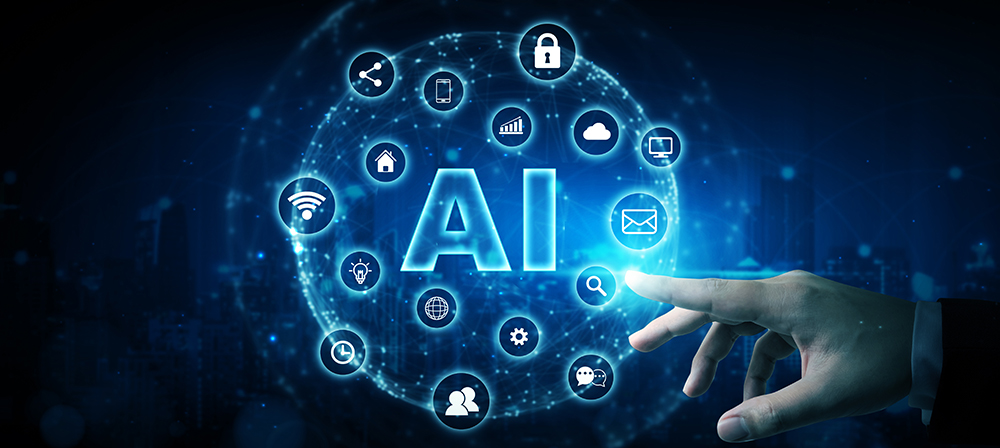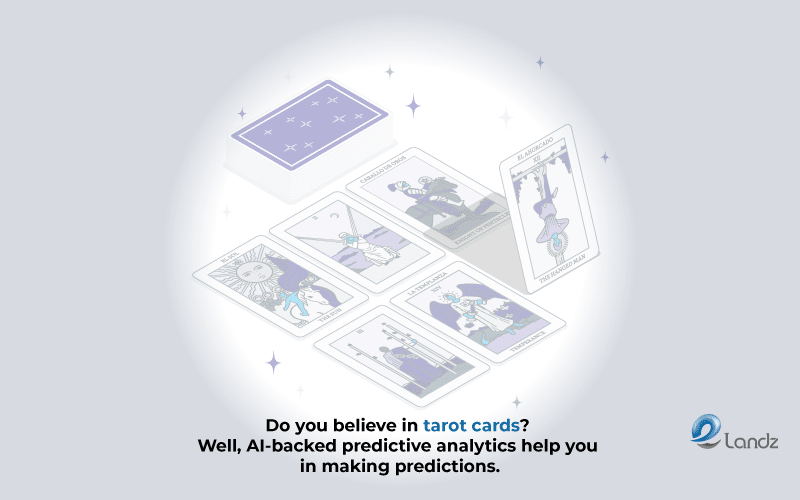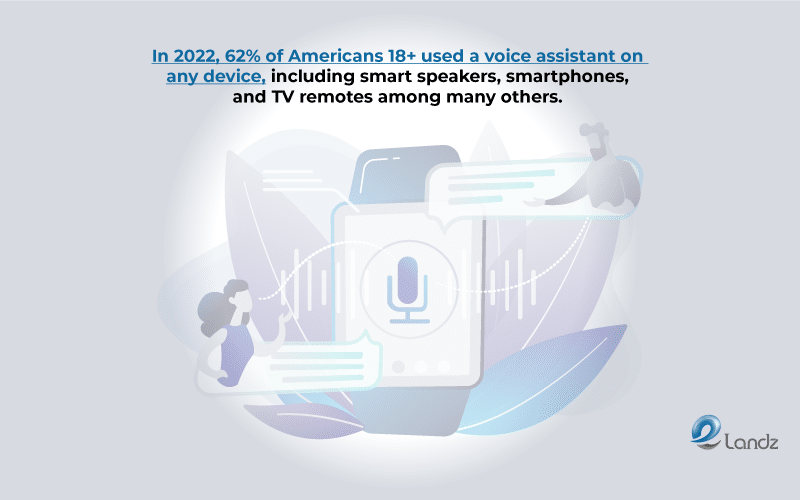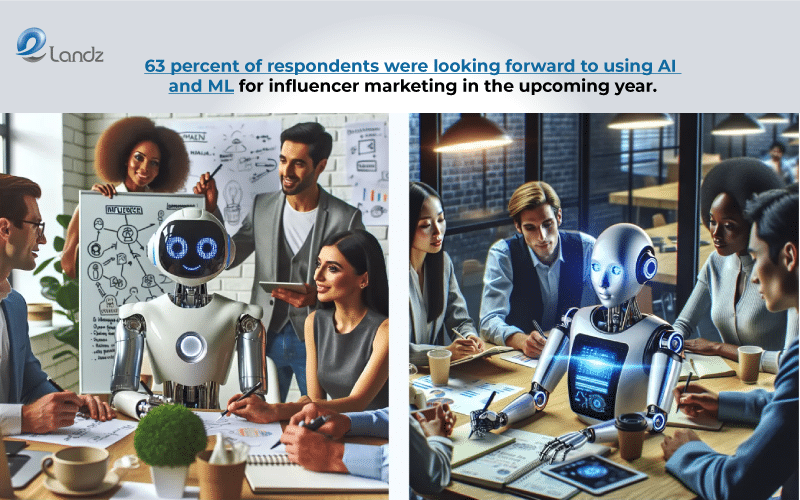
7 Artificial Intelligence Marketing Trends for 2024
30 Sep 2024Introduction
Which artifical intelligence marketing trends are the next big thing? The global market revenues of AI usage in marketing will reach 36 billion U.S. dollars in 2024.
The impact of artificial intelligence on sales and marketing makes businesses more inquisitive about redefining their strategies. Like a ripple effect, marketers and startup leaders are becoming part of the transformative movement.
Which artificial intelligence marketing trends will become even more popular? Let’s dig and discover!
AI Marketing Automation
By this time, you’ve probably heard the term “AI and automation” a couple of times. If you haven’t, it’s time to do some research. Yes, this article focuses on marketing-related trends. However, AI automation is actively impacting other industries.
In my step-by-step guide, I have mentioned how artificial intelligence can automate mundane tasks. However, did you ever wonder? AI vs automation? What is the difference between the two?
Artificial intelligence is a technology that follows preprogrammed rules and instructions. It becomes more advanced as you feed it with more information. The learning phase involves algorithms.
On the other hand, automation involves the systemization of repetitive processes. It means machines can handle routine tasks for you!
AI Marketing Automation Use Cases
Whether it’s digital marketing, sales automation, or creative content generation, AI automation can do it all. More than 58% of marketers say their roles are changing due to AI. However, to get optimal results, always remember: to keep a check!
Mckinsey says that AI can create $1.4 trillion to $2.6 trillion of value in marketing and sales in businesses. From the smallest tasks to complicated activities, AI marketing automation has a role to play.
Through AI marketing automation, you can run custom marketing campaigns that use specific data to create tailored campaigns according to your target audience and budget.
AI-powered marketing automation leads to targeted email campaigns with optimized content according to customer behavior.
Artificial intelligence marketing automation can assist in personalized content such as AI-generated ad copies and customized marketing messages that resonate with the audience.
AI-Driven Predictive Analytics

Do you believe in tarot cards? Well, AI-backed predictive analytics help you in making predictions. However, it is a cutting-edge approach to future forecasting and identifying golden opportunities.
There is a reason why AI predictive analytics is in the second spot on our artificial intelligence marketing trends list! The immense growth potential, and the ability to analyze customer behavior and rectify future risks – all these are solid points.
A 2023 Forrester survey highlights that 53% of marketing leaders use or plan to use AI for predictive analytics and customer insights. The three key components of AI-driven predictive analytics are data, algorithms, and predictions.
Ultimately, statistical algorithms, customer segmentation, and data aid marketing AI leaders in speeding up their operations.
AI Predictive Analytics Use Cases
AI-driven predictive models are all about re-training, finetuning, and adaptation. After receiving the first set of data, and reading patterns, the cycle of evolution begins.
Continuous learning is one of the major characteristics of AI.
Even the purchasing patterns of the customers can unlock actionable insights. The alignment of AI data analytics with the public sector also promotes sustainable digital marketing.
Customer insights mean startup leaders can identify trending topics and what kind of content is most sought after. Online content creation has become more effective.
Netflix uses AI analytics to assess public sentiment on social media platforms, rethink their approach, and always remain relevant.
IBM Watson Content Analytics crawls, imports, and analyzes content to make data available for extensive analysis.
AI-Powered Chatbots
There is another way to automate mundane tasks! Yes, you read it right. I don’t mean to sound dramatic, but AI virtual assistants have come a long way from the simpler days.
62% of consumers would prefer an AI conversational bot over a human customer service agent. It makes complete sense, these bots offer more reliability, 24/7 support, and human conversational characteristics without the baggage!
Another factor that made AI chatbots even more popular is the introduction of Chat GPT. The worldwide recognition made founders, marketers, and tech aficionados even more curious.
AI startups and companies even began investing in releasing their versions of GenAI sales assistants, digital agents, and chatterbots.
AI Chatbots Use Cases
What is the best AI chatbot right now? Well, everyone is familiar with chatGPT but it has some formidable competitors such as Claude and Microsoft CoPilot.
AI chatbots are at the forefront of AI marketing trends in 2024! There is so much to explore, develop and improve. The automation of conversations with users is just the beginning of it.
These AI agents can capture information, use it to pose questions for lead qualification and trigger lead generation campaigns.
Virtual assistants can cater to omnichannel journeys and the rising influx of messages on websites, online apps, Facebook pages, Instagram, etc.
These intelligent bots can receive training in multiple languages and deal with international markets. You can even get localized content.
Voice Search Optimization
Let’s face it. Using your voice to check your phone, look up a new topic, or play your favorite song requires minimal effort. Voice search optimization involves fine-tuning your website’s content to ensure it appears in voice search results.
In 2022, 62% of Americans 18+ used a voice assistant on any device, and those devices included: smart speakers, smartphones, and TV remotes among many others.

The best part is that voice will give accessibility to people with visual impairments and disabilities. It will remold how social media marketing and search engine optimization works. Change is always exciting, and brings with it a slew of benefits.
Whether it is Alexa, Siri, or Google Assistant, online voice search is becoming a preference for many users. As a consequence, the nature of queries is more natural and conversational.
Voice Search Optimization Use Cases
``I believe that adapting strategies to optimize content for voice search should be one of the highest priorities for small-business owners.``
The buzz about voice search optimization is proof that human-technology interactions are transitioning yet again. The effect is no less than profound. Moreover, the hands-free functionality and user-friendliness add to the attractiveness.
33.6% of US internet users between 16 and 64 report using voice assistants every week. In terms of Internet marketing strategies, users will become highly dependent on voice assistants for daily tasks.
People’s conversational phrases can allow marketing teams, and content specialists to choose appropriate long-tail keywords. You can enhance local SEO and post more selective content.
Develop a mobile-friendly website that can bring in voice search traffic since people spend most of their time on their smartphones.
Integrate voice search technology into your customer support channels to allow customers to get answers to their questions in no time! Enterprises can amplify their online content marketing.
AI-Powered Content Creation
Whether it’s Gen AIContent, social media content, or videos, the hype is real! Content can translate into something more meaningful. It can be an audience, buyers, or consumers of a service.
These tasks take up extra hours, from transcribing interviews to editing textual content and researching trending topics. Whereas, creative professionals and marketing experts should be brainstorming and managing the bigger picture.
The most common use of generative AI among marketers is basic content creation (76%) and generating image assets. (62%) We know how artificial intelligence models push the marketing tech sector to innovate and expand.
AI content tools utilize algorithms to absorb human language patterns, soaking up all the details like a sponge. Top AI content creation tools include MidJourney, and Dalle for visuals. Jasper is an AI marketing platform known for blog posts, ads, social media content, etc.
AI Content Creation Use Cases
Will AI replace humans? That’s not the purpose of AI content creation. The main goal is to use tools to take overall content quality to the next level. Staying stuck in one spot is not good, change is inevitable and as they say, the only constant!
With access to the internet and multiple tools, the competition is well-equipped. Therefore, marketing and sales teams must stay in sync with the latest AI marketing trends.
AI content creation means you can repurpose content. Let’s say you have a single article of three thousand words, content writers can generate multiple social posts without overexerting.
Coming to the topic of SEO optimization, there are AI SEO tools that can suggest high-volume keywords, and check grammar.
AI content tools can refine your research phase. How do you ask? Artificial intelligence tools can organize information in an orderly manner.
For instance, an SEO content writer wants to write an article for advertising tech. Detailed prompts can cause Chat GPT to make a suitable outline, meta description, conclusion points, etc.
Multi-Modal AI
Multimodel AI merges varying data types such as text, image, audio, etc. Integrating all these elements delivers a completely immersive experience for the user.
It is a relatively new concept, however, its application can be seen in the digital marketing industry. Business stakeholders and marketing tech experts can extract the most out of their data.
Statistics show that the multimodal AI market will grow at a CAGR of 35.8% from 2024 to 2030. The versatility of multimodal AI marketing makes it an excellent choice for brands to magnify their online presence. For example, the ChatGPT 3.5 version was unimodal, it could only communicate through text.
ChatGPT 4 is a multimodal large language model that can understand images and text. This multimodal AI model had a more comprehensive level of training with a vast array of prompts.
Multi-Modal AI Use Cases
Multi-modal applications are paving the way for a new era of innovation. By analyzing text reviews, social media images, and even voice recordings, these models can deliver a richer understanding of customer preferences and behaviors.
For instance, a fashion brand could use multi-modal AI to align its marketing efforts with trending styles! The method is analyzing Instagram photos while simultaneously assessing customer sentiment from product reviews.
You get marketing campaigns that are not only visually appealing but contextually stronger.
Multi-modal generative AI can enhance customer support. By digging into audio, imagery, and text, you can observe the user from a detailed viewpoint. Even virtual agents become smart due to multimodal AI.
Multi-modal AI can revamp video content management systems. Hence browsing becomes more productive. By intelligently categorizing and tagging videos, it establishes that viewers spend less time searching and more time engaging.
AI Influencer Marketing

Ever heard about AI influencers on Instagram? Within the past couple of years, influencers have shown us that the customer can connect with a brand on an even more personal level. Through product glimpses, unpacking videos, top-five pick-themed reels, etc, viewers tend to research the product.
The addition of artificial intelligence to the mix further customizes online influencer campaigns. They aren’t wrong when they say the buyer is always right, thinking from their perspective is integral.
With AI technologies, marketers and digital content strategists can give influencer marketing campaigns an instant facelift. There is so much room for creativity and unique content.
During a global 2024 survey among marketing agencies and brands, 63 percent of respondents were looking forward to using AI and ML for influencer marketing in the upcoming year.
The coalition between AI and influencer marketing can beef up product or service promotion. Therefore, this AI marketing trend is never going out of fashion, at least for now.
AI Influencer Marketing Use Cases
AI and automation organize influencer marketing workflows! The million-dollar Whopper campaign by Burger King is an exquisite specimen of how AI in influencer marketing can work wonders!
What was the campaign about? First, there was the development of a dream burger creator website where users could freely design their dream burger. The second step was building a contest around the website, and partnering with several influencers.
The campaign was an instant hit. What was the main tool? An AI image-generation tool was the secret ingredient behind the website’s burger customizing abilities.
Give shoppers a chance to try or experiment with a product before buying. Wayfair lets clients place a piece of furniture in their homes, so they can visualize before finalizing. Furthermore, an influencer can show customers how they work in a demo video.
Influencer campaigns can turn into complementary ads. For example, if there is video content of a social media blogger trying a watch or a tech expert talking about mobile phone features. It can metamorphosize into an AI-powered advertisement with all the necessary Google SEO keywords.
AI Marketing Stats You Should Know
In the end, it is all about numbers, isn’t it? AI is no longer a movie idea or a tech whiz fantasy. Rather, it is taking over many industries, and there is a shift towards AI-enabled marketing.
Below are the top 5 statistics as AI marketing trends in 2024 cement their presence in the business world.
In 2021, the market for artificial intelligence (AI) in marketing was at 15.84 billion U.S. dollars and the value projection would increase to more than 107.5 billion by 2028. (Statista)
There were 1.7 billion views of videos related to or using generative AI tools in 2023. (YouTube Trend Stats)
88% of marketers believe their organization must increase its use of automation and AI to meet customer expectations. (MailChimp 2023)
Marketers are more likely to be using AI than professionals in other industries, including finance (16%), engineering (17%), education (22%) and technology (39%). (Marketing Week)
On average, AI can save marketers approximately 2.5 hours per day. According to HubSpot, that adds up to 25-26 additional workdays per year.
Conclusion
AI is not just setting the course for the future. Artificial intelligence marketing trends carve out new channels for how brands engage and “vibe” with their audiences.
It’s time to get those brain juices running! (fast) Marketers who harness these trends will find themselves taking charge to deliver more personalized and stimulating campaigns. Embracing AI’s dynamic capabilities at this stage is a necessity for marketers and digital content specialists.
FAQS
What is the top marketing trend in AI in 2024?
The top artificial intelligence marketing trend for 2024 is the integration of generative AI into marketing technologies.
This trend is leading investments in Martech, as businesses use GenAI to enhance customer engagement, individualize experiences, and optimize marketing strategies.
How to use AI in digital marketing 2024?
Marketers can tailor content and recommendations to individual preferences.
AI-driven analytics offer deep insights into consumer behavior, assisting marketing leaders in making data-backed decisions and predicting trends.
Automation tools reduce repetitive tasks, freeing up resources for strategic initiatives.
Why will AI's creative intelligence change advertising in 2024?
AI can craft compelling visuals and narratives that consumers can relate to.
By personalizing advertising messages, AI releases content that is not only relevant but also emotionally engaging, fostering stronger connections between brands and audiences.
Will AI overtake digital marketing?
AI is unlikely to overtake digital marketing. However, it will markedly enhance and transform it.
AI tools can automate repetitive tasks, provide deep insights through data analysis, and personalize customer interactions, making marketing efforts more fruitful.
How is AI useful in marketing?
Artificial intelligence marketing trends are redefining sales and marketing by offering tools for numerous niches.
Marketing categories include SEO, AI-curated content, online digital marketing, social media management, and in-depth customer reports.


